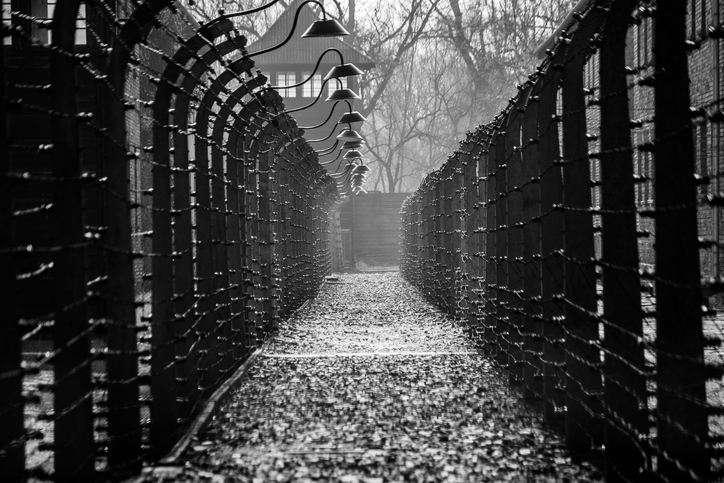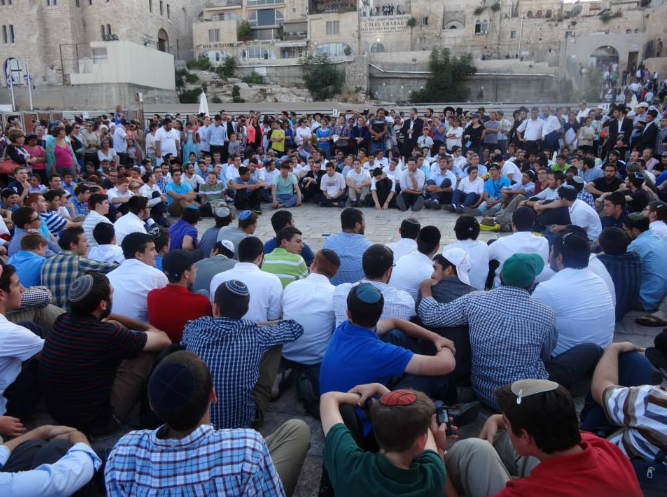Yom Kippur is my favorite day of the year (I know, I’m weird). The intensity, the single-minded focus that spending the day davening in shul allows, the steps of teshuva and self improvement which are spelled out already from Elul; all contribute to allowing me to leave the day feeling cleansed and spiritual. I literally look forward to the Yamim Noraim (High Holy Days) all year long.
And for those same reasons, I find Tisha b’Av difficult. We don’t spend all day in shul with a clear agenda. It’s a day that allows melacha (the restrictions of Shabbat) so we have the distractions of driving and cooking and phones that we don’t have on any other Chagim. The kids are home and need to be occupied. There is no clear objective or framework within the halachic day of how to accomplish our goal to leave Tisha b’Av feeling fulfilled. The end result is that unfortunately, much of my day is spent looking at my watch and counting down how many hours are left to the fast.
And this leaves me with an unsettled feeling because I want to connect to Tisha b’Av.
In theory, the concept of Tisha b’Av is hard to connect to. We are mourning Batei Mikdash (Temples) that were destroyed two thousand years ago. It’s something we never saw and never experienced. It’s awfully hard to cry for something that we don’t know.
And after all, it’s not as if we generally feel anything is missing from our lives. Judaism is flourishing. There are more yeshivot and people learning than ever before, there are droves of people making aliyah, and a thriving baal Teshuva movement. Jews have reached the pinnacle of professional success; it wasn’t that long ago when Senator Joseph Lieberman nearly became Vice President of the United States and just a few weeks ago, a Jewish woman was elected mayor of Mexico City. And today, at the center of our mourning, the city of Jerusalem is bustling, with some even questioning whether they should continue to say the Tefilla (prayer) of Nachem, as the city is hardly desolate and bereft of her children. We are not a trod-upon nation as we once were.
On Tisha b’Av, July 22, 1942, as the first group from the largest ghetto in Europe were deported to their deaths at Treblinka, the Jews of Warsaw felt the words “al eyleh ani bochiya”- for this, I cry. And while there were many times in Jewish History when Jews read Kinnot that evoked tears from scenes that felt all too familiar, on Tisha b’Av, July 22, 2018, we are blessed to live at a time when Jews enjoy relative peace and prosperity. We have come a long way from the scenes described in Eicha. Baruch HaShem.

But this blessing also comes with a challenge. And that challenge is that when things are easy, we tend to forget what we are missing.
With our large observant communities and array of Jewish amenities, we sometimes have an air of complacency. Like Yom Kippur with its clear steps, our life goals have a clear trajectory: marry a person with a similar hashkafa (worldview), work at jobs that can help us afford yeshiva tuition but still allow time for learning and family, settle down in a nice home in Teaneck, The Five Towns, Cleveland or Skokie, which offer its choice of Shuls, schools and kosher restaurants. We send our kids on all the right programs, give tzedaka and strive to grow in our mitzvah observance and chessed. And these are important goals… but they are short term goals. Brooklyn, Lakewood and Lawrence, as sometimes referred to in jest, are not Ir HaKodesh (“the holy city”), even if their Jewish majority rivals that of the Jewish State. Despite the relative ease of our Jewish lives in America today (certainly within the frame of Jewish History), something is not complete. Tisha B’Av is that time to contemplate what’s missing.
And when we stop to think about it, is it really so hard to relate to the pain of being in galut (exile) today? When we see rockets and fire kites aimed at Israel’s South and the response either being silence or Israel’s demonization in the media. When support for Israel has become a partisan issue, and even more painfully, when other Jews stand loudly and clearly against acheinu b’nei Yisrael (our brothers in Israel), it leaves one with a feeling that we are far from geula (redemption). Seeing Jewish names- sometimes even rabbinic leaders- involved in corruption, leaves us longing for the fulfillment of the words of the Haftorah before Tisha b’Av: “V’Ashiva Shoftayich v’VaRishona… Acharei Chen, Yikarei Lach, Ir Ha’Tzedek, Kiryah Ne’emana” (And I will return your judges to what they once were… afterward, you [Jerusalem] will be called a city of justice and a faithful city). Stories of sinat chinam (baseless hatred), both personal and communal are common, leaving little mystery why the Beit HaMikdash is still destroyed. There are so many problems within the Orthodox community: Kids going off the derech, problems with shidduchim, parents struggling to pay yeshiva tuition. And for me, or anyone else living on the front lines of assimilation in this country, the pain of witnessing the reality of the Pew reports of diminishing Jews, is all too reminiscent of the 10 tribes disappearing into ether. Things are not what they should be.
And for those of us with a burning desire to return home to Eretz Yisrael, but are held back by the chains of circumstance- either because of family or financial constraints or because we feel we have something to accomplish in the Diaspora, those chains sometimes feel like the chains of exile.
There is plenty that is relevant to connect to on Tisha b’Av. It may be hard to shed a tear for the Beit HaMikdash but it is all too easy to cry for the state of the Jewish people today, both communally and/or personal challenges.
We can make the day meaningful. But unlike Yom Kippur, when it’s almost hard to avoid the holiness of the day, on Tisha b’Av, we need to make an effort to connect.
There are certainly helpful programs out there. Last year, I watched the livestream of the NCSY Kollel Kumzitz at the Kotel as Tisha b’Av ebbed away in Jerusalem and that opportunity will be available again this year: NCSY Kollel Kumzitz. The Kinnot are difficult to understand but thanks to Rabbi Dr. Tzvi Hersh Weinreb and Rabbi Steven Weil, there will be a Kinnot explanation, which we can watch from the comfort of our own homes: OU Kinnot Explanation. We can read these following pieces that I personally find meaningful on Tisha b’Av: “Why I Like Tisha B’Av” by Rabbi Emanuel Feldman and Mashiach’s Hat. We can watch this powerful story called “Letting Go”, which leaves any grudge we are struggling with seem pale in comparison.

But maybe, we can also try something different this Tisha b’Av. We can go to the shul that we don’t usually attend to make a show of ahavat chinam. We can sign up for a Kiruv opportunity like Partners in Torah, invite someone who is not observant for a Shabbos meal or find a way to get involved with or support NCSY. We can reach out to someone we don’t particularly like. We can spend part of the day introspecting about our relationships and trying to see the other side of a rift. Or as Scott Shulman puts it so beautifully: we can look at life and choose happiness over being right: When Being Right is Wrong.
But aside from moving forward, we need to take some time to think about what we are missing. Because as the Gemara states, anyone who mourns for Yerushalayim will merit to see her rebuilt (Taanit 30b). And with all that Hashem has blessed us with, both in our personal lives, as well as a Jewish nation, we are so far away from where we can be.
Wishing everyone a meaningful Tisha b’Av, an easy fast, and a sincere wish that next year, we will spend the 9th of Av as a Moed, a holiday, in a rebuilt Jerusalem.
Ariela Davis is the Director of Judaics at Addlestone Hebrew Academy and the Rebbetzin of Brith Sholom Beth Israel, the historic shul of downtown Charleston, South Carolina. She writes and speaks about issues related to Israel, the Holocaust and Jewish thought. She can be reached at arieladavis@gmail.com
The words of this author reflect his/her own opinions and do not necessarily represent the official position of the Orthodox Union.

